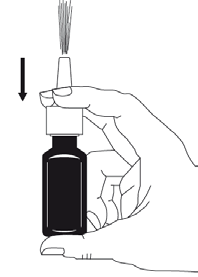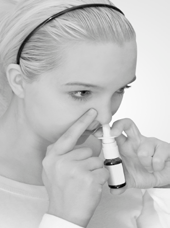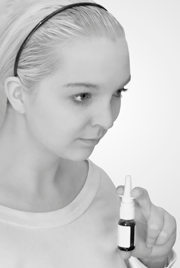
Dimol
Ask a doctor about a prescription for Dimol

How to use Dimol
Leaflet attached to the packaging: patient information
Dymol, (137 micrograms + 50 micrograms)/dose, nasal spray, suspension
Azelastine hydrochloride + Fluticasone propionate
Read the leaflet carefully before using the medicine, as it contains important information for the patient.
- Keep this leaflet, so you can read it again if you need to.
- If you have any doubts, consult your doctor or pharmacist.
- This medicine has been prescribed specifically for you. Do not pass it on to others. The medicine may harm another person, even if their symptoms are the same.
- If the patient experiences any side effects, including those not listed in this leaflet, they should tell their doctor or pharmacist. See section 4.
Table of contents of the leaflet
- 1. What is Dymol and what is it used for
- 2. Important information before using Dymol
- 3. How to use Dymol
- 4. Possible side effects
- 5. How to store Dymol
- 6. Contents of the packaging and other information
1. What is Dymol and what is it used for
Dymol contains two active substances: azelastine hydrochloride and fluticasone propionate.
- Azelastine hydrochloride belongs to a group of medicines called antihistamines. Antihistamines work by preventing the action of substances such as histamine, which the body produces as part of an allergic reaction, and thus reduce the symptoms of allergic rhinitis.
- Fluticasone propionate belongs to a group of medicines called corticosteroids, which reduce inflammation.
Dymol is used to relieve the symptoms of seasonal and perennial allergic rhinitis of moderate to severe intensity, if the use of other nasal products containing only an antihistamine or corticosteroid is considered insufficient.
Seasonal and perennial allergic rhinitis is a type of allergic reaction to substances such as plant pollen (hay fever), house dust mites, mold spores, dust, or pet dander.
Dymol relieves allergy symptoms, such as: runny nose, postnasal drip, sneezing, itching, and feeling of nasal congestion.
2. Important information before using Dymol
When not to use Dymol
- If the patient is allergic to azelastine hydrochloride or fluticasone propionate, or any of the other ingredients of this medicine (listed in section 6).
Warnings and precautions
Before starting to use Dymol, the patient should discuss it with their doctor or pharmacist:
- If the patient has recently undergone nasal surgery.
- If the patient has a nasal infection. Nasal infections should be treated with antibacterial or antifungal medicines. Patients who have been treated with medicines for a nasal infection may continue to treat their allergy with Dymol.
- If the patient has tuberculosis or an untreated infection.
- If the patient notices a change in vision or has been diagnosed with increased intraocular pressure, glaucoma, and/or cataract. Patients with these conditions will be closely monitored during treatment with Dymol.
- If the patient has adrenal gland disorders. Caution is advised when switching from systemic steroid therapy to Dymol therapy.
- If the patient has severe liver disease. This increases the risk of systemic side effects.
In these cases, the doctor will decide whether Dymol can be used.
It is essential for the patient to take the medicine in the dose prescribed below in section 3 or as advised by the doctor.
Taking nasal corticosteroids in higher doses than recommended may cause adrenal gland suppression, a condition that may lead to weight loss, fatigue, muscle weakness, low blood sugar, increased salt requirements, joint pain, depression, and darker skin pigmentation.
In such cases, the doctor may prescribe another medicine during periods of stress or scheduled surgery.
To avoid adrenal gland suppression, the doctor may prescribe the medicine in the smallest dose that will maintain effective control of allergic rhinitis symptoms.
In children and adolescents, long-term use of nasal corticosteroids (such as Dymol) may slow growth rates.
The doctor will regularly check the child's growth and ensure that they are taking the medicine in the lowest effective dose.
If the patient experiences blurred vision or other vision disturbances, they should contact their doctor.
In case of doubts about any of the above situations, the patient should consult their doctor or pharmacist before starting to use Dymol.
Children
Dymol is not recommended for use in children under 12 years of age.
Dymol and other medicines
The patient should tell their doctor or pharmacist about all medicines they are taking, have recently taken, or might take, including those available without a prescription.
Some medicines may enhance the effect of Dymol nasal spray, and the doctor may recommend close monitoring if the patient is taking such medicines (including certain HIV medicines: ritonavir, cobicistat, and antifungal medicines: ketoconazole).
Pregnancy and breastfeeding
If the patient is pregnant or breastfeeding, thinks they may be pregnant, or plans to have a baby, they should consult their doctor or pharmacist before using this medicine.
Driving and using machines
Dymol has a minor influence on the ability to drive and use machines.
Rarely, fatigue and dizziness may occur, which may be caused by the disease itself or the use of Dymol.
In such cases, the patient should not drive or operate machinery.
The patient should be aware that drinking alcohol may enhance such effects.
Dymol contains benzalkonium chloride
This medicine contains 14 micrograms of benzalkonium chloride per actuation, which corresponds to 0.014 mg/0.14 g.
Benzalkonium chloride may cause irritation or swelling inside the nose, especially if used for a long time.
3. How to use Dymol
This medicine should always be used as directed by the doctor or pharmacist.
In case of doubts, the patient should consult their doctor or pharmacist.
To get the most benefit from the treatment, Dymol must be used regularly.
The patient should avoid contact with the eyes.
Adults and adolescents (12 years and older)
- One dose should be administered into each nostril in the morning and evening.
Use in children under 12 years of age
- Dymol is not recommended for use in children under 12 years of age.
Use in patients with renal and hepatic impairment
- There are no data on the use of Dymol in patients with renal and hepatic impairment.
Method of administration
Nasal administration.
The patient should carefully read the instructions below and use the medicine only as directed.
INSTRUCTIONS FOR USE
Preparing the spray
- 1. Gently shake the bottle for 5 seconds, moving it up and down, and then remove the protective cap (see Figure 1).
Figure 1

- 2. If the nasal spray is used for the first time, prime the pump by releasing a dose into the air.
- 3. To prime the pump, place two fingers on either side of the pump and the thumb on the bottom of the bottle.
- 4. Press and release the pump 6 times, until a fine mist is produced (see Figure 2).
- 5. The pump is now primed and ready for use.
Figure 2

- 6. If the nasal spray has not been used for more than 7 days, re-prime the pump by pressing and releasing it once.
Using the spray
- 1. Gently shake the bottle for 5 seconds, moving it up and down, and then remove the protective cap (see Figure 1).
- 2. Blow your nose to clear your nostrils.
- 3. Tilt your head forward towards your toes. Do not tilt your head back.
- 4. Hold the bottle upright and gently place the tip of the nozzle into one nostril.
- 5. Close the other nostril with your finger, press the pump quickly once, and at the same time, take a gentle breath in (see Figure 3).
- 6. Breathe out through your mouth.
Figure 3

- 7. Repeat the same steps for the other nostril.
- 8. After administration, take gentle breaths and do not tilt your head back. This will prevent the medicine from going down your throat and causing an unpleasant taste (see Figure 4).
Figure 4

- 9. After each use, wipe the nozzle tip with a clean tissue or cloth and replace the protective cap.
- 10. If the spray does not spray, do not puncture the nozzle tip. Wash the nozzle tip with water.
It is essential to use the prescribed dose. The patient should only use the dose prescribed by their doctor.
Duration of treatment
Dymol can be used for a long time. The duration of treatment should correspond to the period during which allergy symptoms occur.
Using a higher dose of Dymol than recommended
In case of using too much nasal spray, there is a small risk of complications.
The patient should consult their doctor if they are concerned or have been taking a higher dose than recommended for a long time.
If someone, especially a child, accidentally swallows Dymol, they should immediately contact their doctor or the nearest hospital emergency department.
Missing a dose of Dymol
The patient should use the nasal spray as soon as they remember and then use the next dose at the usual time.
The patient should not take a double dose to make up for a missed dose.
Stopping treatment with Dymol
The patient should not stop using Dymol without consulting their doctor, due to the risk of reduced treatment effectiveness.
In case of further doubts about using this medicine, the patient should consult their doctor or pharmacist.
4. Possible side effects
Like all medicines, Dymol can cause side effects, although not everybody gets them.
The patient should seek medical attention immediately if they experience any of the following symptoms:
- Swelling of the face, lips, tongue, or throat, which may cause difficulty swallowing and/or breathing, as well as a sudden skin rash. These may be symptoms of a severe allergic reaction.
Other side effects include:
Very common side effects(may affect more than 1 in 10 people):
- Nosebleeds
Common side effects(may affect up to 1 in 10 people):
- Headache
- Bitter taste in the mouth, especially if the patient tilts their head back during administration of the nasal spray. This taste should disappear if the patient drinks a non-alcoholic beverage a few minutes after using the medicine
- Unpleasant odor
Uncommon side effects(may affect up to 1 in 100 people):
- Mild irritation inside the nose. This may cause a mild stinging sensation, itching, or sneezing
- Dryness in the nose, cough, dryness of the throat, or throat irritation
Rare side effects(may affect up to 1 in 1,000 people):
- Dryness in the mouth
Very rare side effects(may affect up to 1 in 10,000 people):
- Dizziness or drowsiness
- Cataract, glaucoma, or increased eye pressure, which may cause vision loss and/or eye redness and pain. These side effects have been reported after long-term use of nasal sprays containing fluticasone propionate
- Skin and nasal mucosa damage
- Malaise, fatigue, exhaustion, or weakness
- Rash, itching, or skin redness, itchy blisters on the skin
- Bronchospasm (narrowing of the airways)
Side effects with unknown frequency(cannot be estimated from the available data):
- Blurred vision
- Ulceration of the nasal mucosa
In case of using the medicine in high doses for a long time, systemic side effects (affecting the whole body) may occur.
The likelihood of these side effects is much lower when using nasal corticosteroids than when using oral corticosteroids.
These side effects may vary between patients and after using different corticosteroid medicines (see section 2).
Nasal corticosteroids may affect the normal production of hormones in the body, especially when used for a long time in high doses.
In children and adolescents, these side effects may cause growth retardation.
Rare cases of reduced bone density (osteoporosis) have been observed when corticosteroids were used nasally for a long time.
Reporting side effects
If the patient experiences any side effects, including those not listed in the leaflet, they should tell their doctor or pharmacist.
Side effects can be reported directly to the Department of Drug Safety, Office for Registration of Medicinal Products, Medical Devices, and Biocidal Products, Al. Jerozolimskie 181C, 02-222 Warsaw, tel.: +48 22 49 21 301, fax: +48 22 49 21 309, website: https://smz.ezdrowie.gov.pl
Side effects can also be reported to the marketing authorization holder.
By reporting side effects, more information can be collected on the safety of the medicine.
5. How to store Dymol
The medicine should be stored out of sight and reach of children.
Do not use this medicine after the expiry date stated on the label and carton after EXP.
The expiry date refers to the last day of the month stated.
Do not store in the refrigerator or freeze.
Shelf life after first opening the bottle: The unused medicine should be discarded 6 months after first opening the nasal spray bottle.
Medicines should not be disposed of via wastewater or household waste.
The patient should ask their pharmacist how to dispose of medicines that are no longer needed.
This will help protect the environment.
6. Contents of the packaging and other information
What Dymol contains
The active substances of Dymol are azelastine hydrochloride and fluticasone propionate.
Each gram of suspension contains 1000 micrograms of azelastine hydrochloride and 365 micrograms of fluticasone propionate.
After each actuation of the pump (0.14 g), 137 micrograms of azelastine hydrochloride (corresponding to 125 micrograms of azelastine) and 50 micrograms of fluticasone propionate are released.
The other ingredients are disodium edetate, glycerol, microcrystalline cellulose, sodium carmellose, polysorbate 80, benzalkonium chloride, phenylethyl alcohol, and purified water.
What Dymol looks like and contents of the pack
Dymol is a white, homogeneous suspension.
Dymol is available in a brown glass bottle with a pump spray, nasal applicator, and protective cap in a cardboard box.
The 10 ml bottle contains 6.4 g of nasal spray suspension (at least 28 doses).
The 25 ml bottle contains 23 g of nasal spray suspension (at least 120 doses).
Dymol is available in:
- Packaging containing 1 bottle with 6.4 g of nasal spray suspension
- Packaging containing 1 bottle with 23 g of nasal spray suspension
- Bulk packaging containing 10 bottles, each with 6.4 g of nasal spray suspension
- Bulk packaging containing 3 bottles, each with 23 g of nasal spray suspension
Not all pack sizes may be marketed.
Marketing authorization holder
Viatris Limited
Damastown Industrial Park
Mulhuddart, Dublin 15
Dublin
Ireland
Manufacturer
MEDA Pharma GmbH & Co. KG
Benzstrasse 1
61352 Bad Homburg
Germany
Haupt Pharma Amareg GmbH
Donaustaufer Str. 378
93055 Regensburg
Germany
Mylan Hungary Kft./ Mylan Hungary Ltd
Mylan utca 1
2900 Komárom
Hungary
Madaus GmbH
Lütticher Straße 5
53842 Troisdorf
Germany
To obtain more detailed information about this medicine, the patient should contact the local representative of the marketing authorization holder:
Viatris Healthcare Sp. z o.o.
tel.: +48 22 546 64 00
This medicine is authorized in the Member States of the European Economic Area under the following names:
Table of authorized names:
| Austria | Azeflu |
| Czech Republic | Dymol |
| Denmark | Flutista |
| Finland | Flutista |
| France | AZÉLASTINE CHLORHYDRATE/ FLUTICASONE PROPIONATE VIATRIS 137 micrograms/50 micrograms, suspension pour pulvérisation nasale |
| Greece | Flutista 137 microgram/50 microgram nasal spray, suspension |
| Netherlands | Azelastine/ Fluticasonpropionaat Viatris 137 microgram/50 microgram per verstuing, neusspray, suspensie |
| Germany | Azelastin/Fluticason Viatris 137 Mikrogramm/50 Mikrogramm pro Sprühstoß Nasenspray, Suspension |
| Norway | Dymol |
| Poland | Dymol |
| Portugal | Azelastine + Fluticasone Mylan |
| Romania | AZEFLU 137 micrograme / 50 micrograme spray nazal, suspensie |
| Slovakia | Dymol |
| Slovenia | Dymol 137 mikrogramov/50 mikrogramov na vpih pršilo za nos, suspenzija |
| Sweden | Flutista |
| Hungary | Azelasztin/Flutikazon Viatris 137 mikrogramm / 50 mikrogramm szuszpenziós orrspray |
| Italy | Azelastina e Fluticasone Viatris |
Date of last revision of the leaflet: 08/2024
- Country of registration
- Active substance
- Prescription requiredYes
- ImporterHaupt Pharma Amareg GmbH MADAUS GmbH Meda Pharma GmbH & Co. KG Mylan Hungary Kft.
- This information is for reference only and does not constitute medical advice. Always consult a licensed doctor before taking any medication. Oladoctor is not responsible for medical decisions based on this content.
- Alternatives to DimolDosage form: Aerosol, (137 mcg + 50 mcg)/doseActive substance: fluticasone, combinationsPrescription requiredDosage form: Aerosol, (137 mcg + 50 mcg)/ doseActive substance: fluticasone, combinationsPrescription requiredDosage form: Aerosol, (137 mcg + 50 mcg)/nasal doseActive substance: fluticasone, combinationsPrescription required
Alternatives to Dimol in other countries
The best alternatives with the same active ingredient and therapeutic effect.
Alternative to Dimol in Испания
Alternative to Dimol in Украина
Online doctors for Dimol
Discuss dosage, side effects, interactions, contraindications, and prescription renewal for Dimol – subject to medical assessment and local rules.








